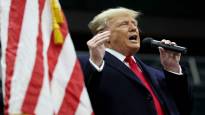DES MOINES, IOWA When the Republican primary votes were counted in Iowa, former Pres Donald Trump was, as expected, the clear winner.
Trump won about half of the state’s votes, with the governor of Florida coming in second Ron DeSantis a fifth. Right on the heels of DeSantis, he had reached third Nikki Haley. A young and flamboyant supporter of Trump’s line Vivek Ramaswamy reached around seven percent of support, but announced that he would end his election campaign soon after the results were known.
The entire country’s attention was precisely on Haley’s support, as she represents the only clear alternative to Trump among the remaining Republican candidates. Although Haley was part of the Trump administration as its ambassador to the United Nations, the former South Carolina governor has stood out as a candidate pleasing to center-line Republicans.
The result of the primaries showed once again that Trump has a tight grip on the party. The bigger question is whether the reason for this is Trump’s continued popularity or the fear of the Republican Party.
For Trump, the election result was good not only in numbers, but also in quality. He increased his support compared to the 2020 election result in about a quarter of the state’s counties.
It tells about the loyalty of the voters and the ability of the election machinery. Even Iowa’s bitter cold, slippery roads, or Trump’s legal battles did not drive away the voters who chose their position. In the Iowa primary, voters must show up at the polls and attend a caucus, and that’s what Trump voters did.
On the other hand, the election machinery was also successful. As of this writing, the exact data on the electorate is still being exhausted, but Trump seems to have converted new voters to his side. First-time voters in Iowa were the most important target groups for Trump’s campaign workers, and their outreach seems to have been successful.
In his election night speech, the milder than usual Trump thanked not only his family, but also his supporters at different levels and his campaign machinery, for good reason.
In his speech, Trump also thanked the other candidates for a nice campaign. And for good reason – both Ron DeSantis and Nikki Haley seem to have ruined their own chances of winning so that Trump and his supporters wouldn’t get angry.
The Republican primaries have been marked from the start by a familiar phenomenon in American politics, i.e. the fear of Trump.
Both Ron DeSantis and Nikki Haley have tried during their campaigns to present themselves as alternatives to Trump without properly criticizing the former president.
The candidates have avoided talking about the fact that it is a former president who kept top-secret documents in his own mansion, concretely endangering national security.
They haven’t talked about it either, that this is a president who started systematically questioning the democratic system even before the 2020 elections. The same former president who incited his supporters to march on the Capitol to violently stop the transition process.
For this very reason, the only candidate who directly criticized Trump during his campaign, Chris Christie, after dropping out of the competition last week, did not recommend anyone to his voters. According to him, you cannot recommend candidates to voters who do not directly say that Trump is not fit for president.
In the very last meters, both DeSantis and Haley woke up to one fact: if you campaign that you are an alternative but you don’t justify why an alternative is needed, the argument will be hollow.
At his campaign rally over the weekend, Ron DeSantis timidly attacked Trump, saying that if Trump is the candidate, he will pursue his own interests. Haley, on the other hand, has hinted softly that if Trump is the party’s candidate, “the same old mood will continue”, without however directly saying what that same old means and why voters should be worried about it.
A culture of shunning and silence leads to it, that the party does not discuss Trump’s eligibility for election out loud. It directly affects voter behavior.
During Trump’s rise, there was talk of silent Trump supporters who didn’t say they were voting for Trump out loud but voted anyway. Now the situation is different, and the center-line Republicans are silent.
At the Iowa caucus, where ‘s team monitored the voting, a couple of voters said they were going to vote for Haley, but did not want to give an interview about it. One woman stated that it could be harmful to her company’s customer relations, so it is better to vote quietly.
One of the Republican leaders of the constituency, behind Nikki Haley Terry Rich, said frankly that he didn’t want to say his position out loud in the American media. It could lead to problems in your own political career.
It is difficult to blame individual voters for their fear. Trump’s revenge has derailed the lives of many ordinary people. The man who worked in the world’s most influential party has incited his supporters to go after local politicians and polling officials.
The Republican leadership has never publicly shown a desire to break away from Trump. The wishes of the party elite can be seen mostly in donations pouring into Nikki Haley’s campaign.
It may not be a winning strategy. The future Republican candidate will face Biden in the November elections, who is a rare unpopular and weak candidate for a sitting president in opinion polls.
Based on the polls, it is clear that Haley would be the strongest opponent for Biden. Haley also appeals to unaffiliated and Democratic voters, and above all to women in the suburbs – and it is they who have been a very decisive group of voters during the last few elections.
Haley still has no chance alongside Trump. The Republican candidate is chosen in the Republican primary.
Without a proper debate, there is no real challenger to Trump.
